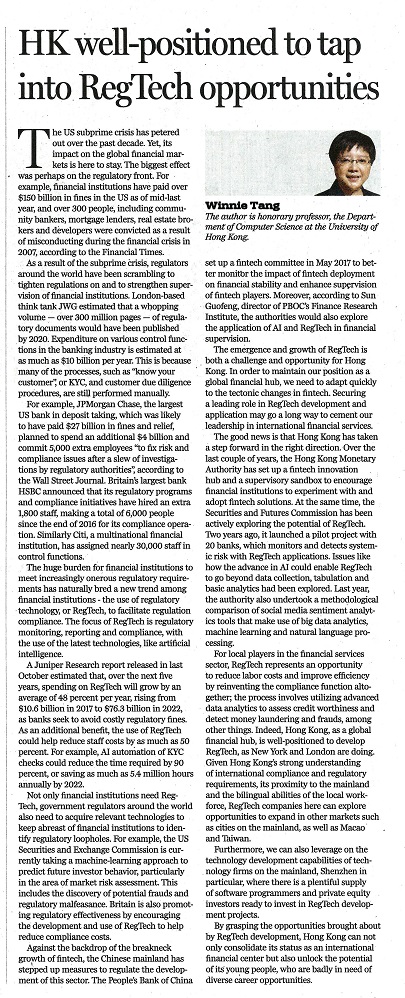網上版請按此

HK well-positioned to tap into RegTech opportunities
The US subprime crisis has petered out over the past decade. Yet, its impact on the global financial markets is here to stay. The biggest effect was perhaps on the regulatory front. For example, financial institutions have paid over $150 billion in fines in the US as of mid-last year, and over 300 people, including community bankers, mortgage lenders, real estate brokers and developers were convicted as a result of misconducting during the financial crisis in 2007, according to the Financial Times.
As a result of the subprime crisis, regulators around the world have been scrambling to tighten regulations on and to strengthen supervision of financial institutions. London-based think tank JWG estimated that a whopping volume — over 300 million pages — of regulatory documents would have been published by 2020. Expenditure on various control functions in the banking industry is estimated at as much as $10 billion per year. This is because many of the processes, such as "know your customer", or KYC, and customer due diligence procedures, are still performed manually.
For example, JPMorgan Chase, the largest US bank in deposit taking, which was likely to have paid $27 billion in fines and relief, planned to spend an additional $4 billion and commit 5,000 extra employees "to fix risk and compliance issues after a slew of investigations by regulatory authorities", according to the Wall Street Journal. Britain's largest bank HSBC announced that its regulatory programs and compliance initiatives have hired an extra 1,800 staff, making a total of 6,000 people since the end of 2016 for its compliance operation. Similarly Citi, a multinational financial institution, has assigned nearly 30,000 staff in control functions.
The huge burden for financial institutions to meet increasingly onerous regulatory requirements has naturally bred a new trend among financial institutions - the use of regulatory technology, or RegTech, to facilitate regulation compliance. The focus of RegTech is regulatory monitoring, reporting and compliance, with the use of the latest technologies, like artificial intelligence.
A Juniper Research report released in last October estimated that, over the next five years, spending on RegTech will grow by an average of 48 percent per year, rising from $10.6 billion in 2017 to $76.3 billion in 2022, as banks seek to avoid costly regulatory fines. As an additional benefit, the use of RegTech could help reduce staff costs by as much as 50 percent. For example, AI automation of KYC checks could reduce the time required by 90 percent, or saving as much as 5.4 million hours annually by 2022.
Not only financial institutions need RegTech, government regulators around the world also need to acquire relevant technologies to keep abreast of financial institutions to identify regulatory loopholes. For example, the US Securities and Exchange Commission is currently taking a machine-learning approach to predict future investor behavior, particularly in the area of market risk assessment. This includes the discovery of potential frauds and regulatory malfeasance. Britain is also promoting regulatory effectiveness by encouraging the development and use of RegTech to help reduce compliance costs.
Against the backdrop of the breakneck growth of fintech, the Chinese mainland has stepped up measures to regulate the development of this sector. The People's Bank of China set up a fintech committee in May 2017 to better monitor the impact of fintech deployment on financial stability and enhance supervision of fintech players. Moreover, according to Sun Guofeng, director of PBOC's Finance Research Institute, the authorities would also explore the application of AI and RegTech in financial supervision.
The emergence and growth of RegTech is both a challenge and opportunity for Hong Kong. In order to maintain our position as a global financial hub, we need to adapt quickly to the tectonic changes in fintech. Securing a leading role in RegTech development and application may go a long way to cement our leadership in international financial services.
The good news is that Hong Kong has taken a step forward in the right direction. Over the last couple of years, the Hong Kong Monetary Authority has set up a fintech innovation hub and a supervisory sandbox to encourage financial institutions to experiment with and adopt fintech solutions. At the same time, the Securities and Futures Commission has been actively exploring the potential of RegTech. Two years ago, it launched a pilot project with 20 banks, which monitors and detects systemic risk with RegTech applications. Issues like how the advance in AI could enable RegTech to go beyond data collection, tabulation and basic analytics had been explored. Last year, the authority also undertook a methodological comparison of social media sentiment analytics tools that make use of big data analytics, machine learning and natural language processing.
For local players in the financial services sector, RegTech represents an opportunity to reduce labor costs and improve efficiency by reinventing the compliance function altogether; the process involves utilizing advanced data analytics to assess credit worthiness and detect money laundering and frauds, among other things. Indeed, Hong Kong, as a global financial hub, is well-positioned to develop RegTech, as New York and London are doing. Given Hong Kong's strong understanding of international compliance and regulatory requirements, its proximity to the mainland and the bilingual abilities of the local workforce, RegTech companies here can explore opportunities to expand in other markets such as cities on the mainland, as well as Macao and Taiwan.
Furthermore, we can also leverage on the technology development capabilities of technology firms on the mainland, Shenzhen in particular, where there is a plentiful supply of software programmers and private equity investors ready to invest in RegTech development projects.
By grasping the opportunities brought about by RegTech development, Hong Kong can not only consolidate its status as an international financial center but also unlock the potential of its young people, who are badly in need of diverse career opportunities.
Dr. Winnie Tang
Honorary professor, the Department of Computer Science at the University of Hong Kong.